- Home
- Jhumpa Lahiri
In Other Words Page 7
In Other Words Read online
Page 7
I remember vividly the moment when the nymph Daphne is transformed into a laurel tree. She is fleeing Apollo, the love-struck god who pursues her. She would like to remain alone, chaste, dedicated to the forest and the hunt, like the virgin Diana. Exhausted, the nymph, unable to outstrip the god, begs her father, Peneus, a river divinity, to help her. Ovid writes, “She has just ended this prayer when a heaviness pervades her limbs, her tender breast is bound in a thin bark, her hair grows into leaves, her arms into branches; her foot, a moment before so swift, remains fixed by sluggish roots, her face vanishes into a treetop.” When Apollo places his hand on the trunk of this tree “he feels the breast still trembling under the new bark.”
Metamorphosis is a process that is both violent and regenerative, a death and a birth. It’s not clear where the nymph ends and the tree begins; the beauty of this scene is that it portrays the fusion of two elements, of both beings. The words that describe both Daphne and the tree are right next to each other (in the Latin text, frondem/crines, ramos/bracchia, cortice/pectus; leaves/hair, branches/arms, bark/breast). The contiguity of these words, their literal juxtaposition, reinforces the state of contradiction, of entanglement. It gives us a double impression, throwing us off. It expresses in the mythical, I would say primordial, sense the meaning of being two things at the same time. Of being something undefined, ambiguous. Of having a dual identity.
Until she is transformed, Daphne is running for her life. Now she is stopped; she can no longer move. Apollo can touch her but he can’t possess her. Though cruel, the metamorphosis is her salvation. On the one hand, she loses her independence. On the other, as a tree, she remains forever in the wood, her place, where she has another sort of freedom.
As I said before, I think that my writing in Italian is a flight. Dissecting my linguistic metamorphosis, I realize that I’m trying to get away from something, to free myself. I’ve been writing in Italian for almost two years, and I feel that I’ve been transformed, almost reborn. But the change, this new opening, is costly; like Daphne, I, too, find myself confined. I can’t move as I did before, the way I was used to moving in English. Now a new language, Italian, covers me like a kind of bark. I remain inside: renewed, trapped, relieved, uncomfortable.
Why am I fleeing? What is pursuing me? Who wants to restrain me?
The most obvious answer is the English language. But I think it’s not so much English in itself as everything the language has symbolized for me. For practically my whole life English has represented a consuming struggle, a wrenching conflict, a continuous sense of failure that is the source of almost all my anxiety. It has represented a culture that had to be mastered, interpreted. I was afraid that it meant a break between me and my parents. English denotes a heavy, burdensome aspect of my past. I’m tired of it.
And yet I was in love with it. I became a writer in English. And then, rather precipitously, I became a famous writer. I received a prize that I was sure I did not deserve, that seemed to me a mistake. Although it was an honor, I remained suspicious of it. I couldn’t connect myself to that recognition, and yet it changed my life. Since then I’ve been considered a successful author, so I’ve stopped feeling like an unknown, almost anonymous apprentice. All my writing comes from a place where I feel invisible, inaccessible. But a year after my first book was published I lost my anonymity.
By writing in Italian, I think I am escaping both my failures with regard to English and my success. Italian offers me a very different literary path. As a writer I can demolish myself, I can reconstruct myself. I can join words together and work on sentences without ever being considered an expert. I’m bound to fail when I write in Italian, but, unlike my sense of failure in the past, this doesn’t torment or grieve me.
If I mention that I’m writing in a new language these days, many people react negatively. In the United States, some advise me not to do it. They say they don’t want to read me translated from a foreign tongue. They don’t want me to change. In Italy, even though many have encouraged me to take this step, many support me, I’m still asked why I have a desire to write in a language that is much less widely read in the world than English. Some say that my renunciation of English could be disastrous, that my escape could lead me into a trap. They don’t understand why I want to take such a risk.
These reactions don’t surprise me. A transformation, especially one that is deliberately sought, is often perceived as something disloyal, threatening. I am the daughter of a mother who would never change. In the United States, she continued, as far as possible, to dress, behave, eat, think, live as if she had never left India, Calcutta. The refusal to modify her aspect, her habits, her attitudes was her strategy for resisting American culture, for fighting it, for maintaining her identity. Becoming or even resembling an American would have meant total defeat. When my mother returns to Calcutta, she is proud of the fact that, in spite of almost fifty years away from India, she seems like a woman who never left.
I am the opposite. While the refusal to change was my mother’s rebellion, the insistence on transforming myself is mine. “There was a woman … who wanted to be another person”: it’s no accident that “The Exchange,” the first story I wrote in Italian, begins with that sentence. All my life I’ve tried to get away from the void of my origin. It was the void that distressed me, that I was fleeing. That’s why I was never happy with myself. Change seemed the only solution. Writing, I discovered a way of hiding in my characters, of escaping myself. Of undergoing one mutation after another.
One could say that the mechanism of metamorphosis is the only element of life that never changes. The journey of every individual, every country, every historical epoch, of the entire universe and all it contains, is nothing but a series of changes, at times subtle, at times deep, without which we would stand still. The moments of transition, in which something changes, constitute the backbone of all of us. Whether they are a salvation or a loss, they are moments that we tend to remember. They give a structure to our existence. Almost all the rest is oblivion.
I think that the power of art is the power to wake us up, strike us to our depths, change us. What are we searching for when we read a novel, see a film, listen to a piece of music? We are searching, through a work of art, for something that alters us, that we weren’t aware of before. We want to transform ourselves, just as Ovid’s masterwork transformed me.
In the animal world metamorphosis is expected, natural. It means a biological passage, including various specific phases that lead, ultimately, to complete development. When a caterpillar is transformed into a butterfly it’s no longer a caterpillar but a butterfly. The effect of the metamorphosis is radical, permanent. The creature has lost its old form and gained a new, almost unrecognizable one. It has new physical features, a new beauty, new capacities.
A total metamorphosis isn’t possible in my case. I can write in Italian, but I can’t become an Italian writer. Despite the fact that I’m writing this sentence in Italian, the part of me conditioned to write in English endures. I think of Fernando Pessoa, a writer who invented four versions of himself: four separate, distinct writers, thanks to which he was able to go beyond the confines of himself. Maybe what I’m doing, by means of Italian, resembles his tactic. It’s not possible to become another writer, but it might be possible to become two.
Oddly, I feel more protected when I write in Italian, even though I’m also more exposed. It’s true that a new language covers me, but unlike Daphne I have a permeable covering, I’m almost without a skin. And although I don’t have a thick bark, I am, in Italian, a tougher, freer writer, who, taking root again, grows in a different way.
PLUMBING THE DEPTHS
Between 1948 and 1950, the last two years of his life, Cesare Pavese, as a consultant for the publishing house Einaudi, writes a series of letters to Rosa Calzecchi Onesti, today famous for her innovative translations of the Iliad and the Odyssey. Through a dense and lively correspondence between Turin and Cesena, Pavese, who didn’t kno
w the translator in person, pushes her to translate Homer into a faithful but modern Italian, aiming at a less archaic, plainer language. Reading with close attention, meticulously comparing the translation with the original text, examining all of it with care, Pavese reacts to every book, every line, every image, every word. His letters are full of suggestions, amendments, opinions. He intervenes frankly but always in a respectful, cordial way. Among the proposals in a long list: “I would insist on bellissima [very beautiful] rather than eletta per bellezza [outstanding in beauty] which gives a needlessly ‘sublime’ tone”; “Assassino [murderer] seems to me better than uccisore d’uomini [killer of men]”; “Del mare [of the sea] I would make marino [marine].” Sometimes he fully approves a decision that Calzecchi Onesti has made; regarding the classic Homeric epithet “wine-dark sea,” he writes, “I agree with dark sea. Out with the wine.”
Pavese and Calzecchi Onesti are doing what all the writers in the world do, along with those who are involved with writing: they are trying to find the right word, to choose, finally, the one that is most exact, most incisive. It’s a process of sifting, which is exhausting and, at times, exasperating. Writers can’t avoid it. The heart of the craft lies there.
Pavese’s letters reveal a powerful, intimate knowledge of his own language. As a writer I aim at doing what he does, but I can do it only in English. I can’t dive into Italian to the same depths. I can hope to write correctly, choose an alternative word. But I don’t have a vocabulary that has been experienced, seasoned since childhood. I can’t examine Italian with the same precision. I can’t evaluate an Italian text, not even one written by me, from the same perspective.
Yet the impulse to track down the right word remains irrepressible, so even in Italian I try. I check the thesaurus, I leaf through my notebook. I put in a new word, just read that morning in the newspaper. But my first readers often shake their heads, saying simply, “It doesn’t sound right.” They say that the word I’d like to use is now considered dated, that it belongs to a register too low or too refined, that it sounds either precious or too colloquial (thus I learned the adjective aulico, lofty). They say that the word order isn’t natural, that the punctuation doesn’t work. Correctness doesn’t necessarily enter into it. They say that an Italian would not express himself like that.
I have to listen to those readers, I have to follow their advice. I have to remove the incorrect or wrong word and look for another. I can’t defend my choice: one can’t contradict a native speaker. I have to accept that in Italian I am partly deaf and blind, and so I’m afraid of being a spurious writer.
I now have quite an extensive vocabulary, but it’s an eccentric one. I feel as if I were dressed in an outlandish manner, wearing a long, elegant skirt of another era, a T-shirt, a straw hat, and slippers. That graceless effect, those muddled tones might be the consequence of the distance, from the beginning, between me and Italian: of my having absorbed the language for years from afar, from a variety of sources, before I lived in Italy. For two years I’ve been learning the language in a comfortable, daily way. But now that I read in Italian my vocabulary is also molded by an amalgam of writers, of various historical epochs, who write in diverse styles. In my notebooks I list words of Manganelli, Verga, Elena Ferrante, Leopardi, without making any distinction. Beckett said that writing in French allowed him to write without style. On the one hand I agree: one could say that my writing in Italian is a type of unsalted bread. It works, but the usual flavor is missing.
On the other hand, I think that it does have a style, or at least a character. The language seems like a waterfall. I don’t need every drop, and yet I’m still thirsty. I suspect, therefore, that the problem isn’t the absence of style but perhaps an excess, by which I feel overwhelmed. What I lack in Italian is a sharp vision, and so I can’t hone a specific style. Furthermore I can’t grasp it. If I happen to formulate a good sentence in Italian, I can’t understand exactly why it’s good.
I remain, in Italian, an ignorant writer, aware only that I’m in disguise. In fact I feel like a child who sneaks into her mother’s closet to try on the high-heeled shoes, an evening dress, some jewelry, a fur coat.
I’m afraid of being caught in the act, of being rebuked, sent to my room. “You have to wait,” my mother would say. “These things are too big for you.” She’s right. I can’t walk in the shoes. The necklace feels heavy, I stumble on the hem of the dress. Although the fur coat is stylish, I’m sweating inside it.
Like the tide, my vocabulary rises and falls, comes and goes. The words added every day in the notebook are transient. I spend an hour choosing the right one, but then, often, I forget it. Now when I encounter an unfamiliar word in Italian I already know several terms, also in Italian, to express the same thing. For example I recently learned accantonare (set aside), already knowing rinviare and sospendere. I discovered travalicare (cross over), already knowing oltrepassare and superare. I underlined tracotante (arrogant), already knowing arrogante and prepotente. A little while ago I acquired azzeccato (well aimed, exact) and ficcante (incisive); before, I would have used adatto, appropriato.
I do my best to hit the target, but when I take aim I never know where the arrow will land. At least a hundred times while I was writing the chapters of this book I felt so demoralized, so disheartened, that I would have liked to stop. In those dark moments my Italian writing seemed to me a mad undertaking, a slope too steep. Yet if I want to go on writing in Italian I have to withstand those stormy moments when the sky darkens, when I despair, when I fear I’m at the end of my rope.
I envy Pavese, and his capacity to plumb Italian to the depths. But I think that I, too, have taken a sounding by way of these reflections. Investigating my discovery of the language, I think I have investigated myself. The verb sondare means “to explore, to examine.” It means, literally, to measure the depth of something. According to my dictionary the verb means “seek to know, to understand something, in particular the thoughts and intentions of others.” It implies detachment, uncertainty; it implies a state of immersion. It means methodical, stubborn research, into something that remains forever out of reach. A well-aimed verb that perfectly explains my project.
THE SCAFFOLDING
I conceived and wrote this book in a library in the ghetto in Rome. When I came to the city for the first time, more than ten years ago, it was the first neighborhood I discovered. It remains my favorite. I’ll never forget the emotion of seeing the Portico di Ottavia, a short distance from the apartment we had rented for a week. It made such an impression that after returning to New York I wrote, in English, a story set in the ghetto, in which I described the ruins of the portico: “its chewed-up columns girded with scaffolding, its massive pediment with significant chunks missing.” At the time, this ancient complex, ravaged, in pieces, rebuilt many times, yet still standing, for me embodied the sense of the city. And now it gives me the metaphor with which I would like to end this series of reflections.
I write to feel alone. Ever since I was a child it has been a way of withdrawing, of finding myself. I need silence and solitude. When I write in English I take for granted that I can do it without help. Someone may give me a suggestion, point out a problem. But in terms of the linguistic journey I am self-sufficient.
In Italian I’ve taken a different path. I was alone in the library, it’s true. While I was writing no one was with me. My only companion was a volume of the poems and letters of Emily Dickinson, the solitary poet who spent her entire life in Massachusetts, not far from where I grew up. A beautiful red book, an Italian translation, that among all the others on the library shelves happened to draw my attention. Often, before starting a new piece, I would read one of the poems or letters. It became a kind of ritual. One day I found these lines: “I feel that I am sailing upon the brink of an awful precipice, from which I cannot escape & over which I fear my tiny boat will soon glide if I do not receive help from above.” I was amazed. Writing these chapters, I felt exactly like that.
I wrote them in order, one after the other, as if they were homework for my Italian lessons. For six months, I drafted one more or less every week. I’d never undertaken a writing project in such a methodical way. I sent the first draft to my teacher, who was the first reader. During our lessons we worked together. It was a rigorous process, both for me and for him. He saw all the gross mistakes, all the mortal sins: gli penso rather than ci penso, sono chiesta rather than mi viene chiesto (I think about him, I’m asked). At first he gave me a series of copious, punctilious notes. (“Be careful not to use too many verbs as nouns”; “Mica”—at all, it’s not like—“is too colloquial”; “Lasciarsi alle spalle”—leave behind. “Lasciare isn’t wrong but it’s less natural.”) For the first story, which was less than five hundred words long, he made thirty-two notes at the bottom of the page. He gave me alternative words, he corrected (and rebuked) me when for the hundredth time I made a mistake in the subjunctive, a gerund, a conditional clause. He explained how English stalked me. He pointed out, always patiently, how many times a wrong preposition screwed things up.

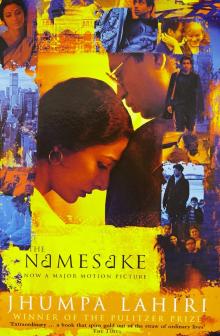 The Namesake
The Namesake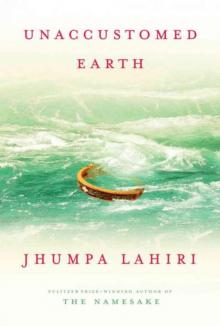 Nobody's Business
Nobody's Business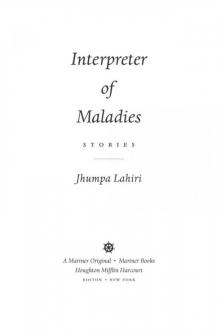 Interpreter of Maladies
Interpreter of Maladies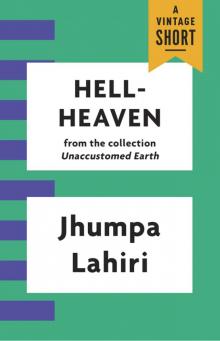 Hell-Heaven
Hell-Heaven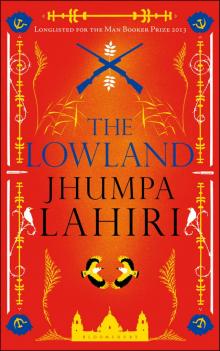 The Lowland
The Lowland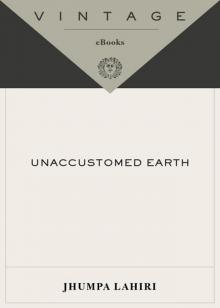 Unaccustomed Earth
Unaccustomed Earth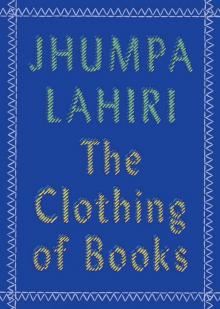 The Clothing of Books
The Clothing of Books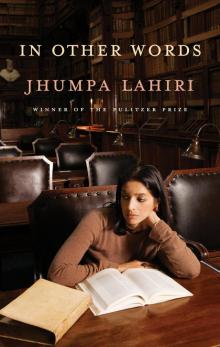 In Other Words
In Other Words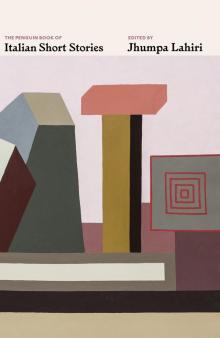 The Penguin Book of Italian Short Stories
The Penguin Book of Italian Short Stories